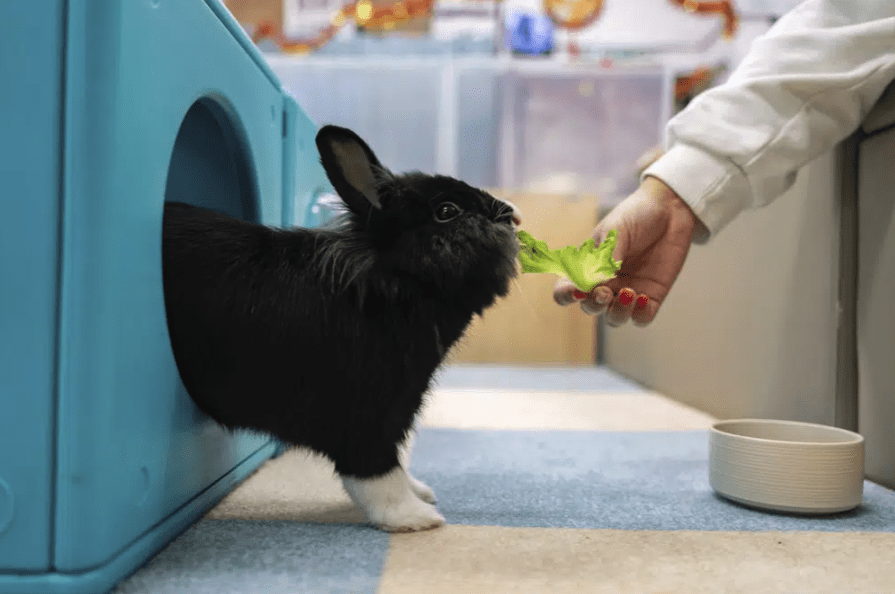News of the weird: Hong Kong pet rabbits enjoy bunny resort while owners away
Published 11:21 am Tuesday, January 24, 2023

- A staff member feeds a rabbit at the Bunny Style Hotel in Hong Kong, Wednesday, Jan. 18, 2023. With the lifting of COVID restrictions, Hong Kongers are traveling again and some of those who keep rabbits at pets are booking them into a rabbit resort where they are fed, exercised and pampered with spa treatments. The Lunar New Year of the Rabbit is shining a particular spotlight on the popularity of the animals in the crowded city of tiny apartments. (AP Photo/Anthony Kwan)
HONG KONG — Rabbits scamper around a play area in a climate-controlled building in suburban Hong Kong, some climbing a castle made of wood while others explore a cotton tunnel.
In one of the world’s most densely populated cities, where most apartments range from small to miniscule, rabbits are popular pets.
And when their owners are away, there are rabbit lovers ready to look after their lonely pets at Bunny Style, a luxury rabbit resort.
That’s especially evident this month, as the lifting of COVID-19 restrictions in Hong Kong is spurring a surge in travel for the Lunar New Year to welcome the Year of the Rabbit.
Donna Li, the owner of Bunny Style, said she’s fully booked for the holiday and keeps her charges happy with regular exercise, parties, spa treatments and lots of hay.
“We aim to provide a secure environment,” Li said.
Li, who has two pet rabbits of her own, set up Bunny Style in June, starting with just a playroom offering space to hop and relief from Hong Kong’s hot, humid weather.
“To begin with, my idea was mainly about setting up a safe indoor play space with a suitable temperature for rabbits,” Li said.
As the government began lifting COVID-19 restrictions in September, Li sensed a need and swiftly set up boarding facilities. They were full over Christmas and Li has already begun taking bookings for Easter.
With 15 rabbits, Li and her staff will be busy over the holiday, the most important in the Chinese calendar. Apart from feeding — some owners order special vegetable cakes in advance — there are hair-brushing, nail trimming and exercising to be managed.
“I think rabbits understand what people say. They can sense whether we are being nice to them and look after them well,” Li said. “And so when I look after them, I talk to them a lot, telling them how beautiful and cute they are.”
A livestream and video clips are also provided, “so we knew that our rabbit was out actively hopping and enjoying itself,” said Rainbow Li, who found Bunny Style on the internet and boarded her rabbit while she and her partner traveled over Christmas.
Bunny Style charges about $15 per night, including half an hour of supervised play time. Beauty treatments and special menu items are extra.
The animals’ popularity in Hong Kong has inevitably led to some owners finding they’ve bit off more than they can chew. For that, there are shelters such as Tolobunny, set up in 2015 and dedicated to finding new homes for abandoned rabbits, often at public adoption events.
Spokesperson Bridget Ng is already anticipating a surge of calls to the shelter’s 24-hour rescue hotline in the months after the new year. Already, its volunteers are temporarily housing 42 rabbits given up by their owners.
“Our observation is that throughout the year, especially at festive holidays like Valentine’s Day, Easter or Christmas, there are more people who want to keep rabbits, but after a few months, there will be more abandoned rabbits,” Ng said.
Homeless dogs and cats still get more care, but “I hope there will be more attention and resources for all kinds of abandoned animals,” founder Winky Cheng said.
Bill banning sale of kangaroo parts introduced in Oregon
SALEM — A bill that would ban the sale of kangaroo parts has been introduced in the Oregon Legislature, taking aim at sports apparel manufacturers that use leather from the animals to make their products.
Soccer cleats are one of the only products made from kangaroo leather that are routinely sold in Oregon, KLCC reported. The measure would impact Nike, which is based in Oregon and the state’s largest employer.
“It’s unconscionable that millions of native wild animals in Australia have been killed for the sake of high-end soccer cleats worn by a subset of elite soccer players,” Democratic Oregon Sen. Floyd Prozanski, who introduced the bill, said in a news release issued Monday, Jan. 23, by animal rights groups. “I understand this legislation may have financial impact on some Oregon shoe manufacturers, but in the balance Oregon should be standing on the humane side of this issue. There are other materials that can be used in making these high-end cleats.”
In the news release, the Center for a Humane Economy, Animal Wellness Action and the Animal Wellness Foundation welcomed the move.
“It’s time for these shoe manufacturers to evolve their business model to eliminate extreme animal cruelty in their product offerings,” said Rene Tatro, a board member of the Center for a Humane Economy.
Nike didn’t respond to KLCC’s request for comment, but the company told ESPN last month that it uses kangaroo leather in a “small portion” of its soccer shoes and that it “works with leather suppliers that source animal skins from processors that use sound animal husbandry and humane treatment, whether farmed, domesticated, or wild managed.”
Oregon’s bill would make it a crime to buy, receive, sell, or commercially exchange “any product containing a part of a dead kangaroo.”
The commercial harvest of kangaroos in Australia is legal. More than 1.3 million kangaroos were killed for commercial purposes in the country in 2021, KLCC reported, citing the Australia Department of Climate Change, Energy, the Environment and Water. The agency said that number represents less than one-third of the “sustainable quota,” which is the amount it considers could be killed without putting any of the four main kangaroo species at risk.






